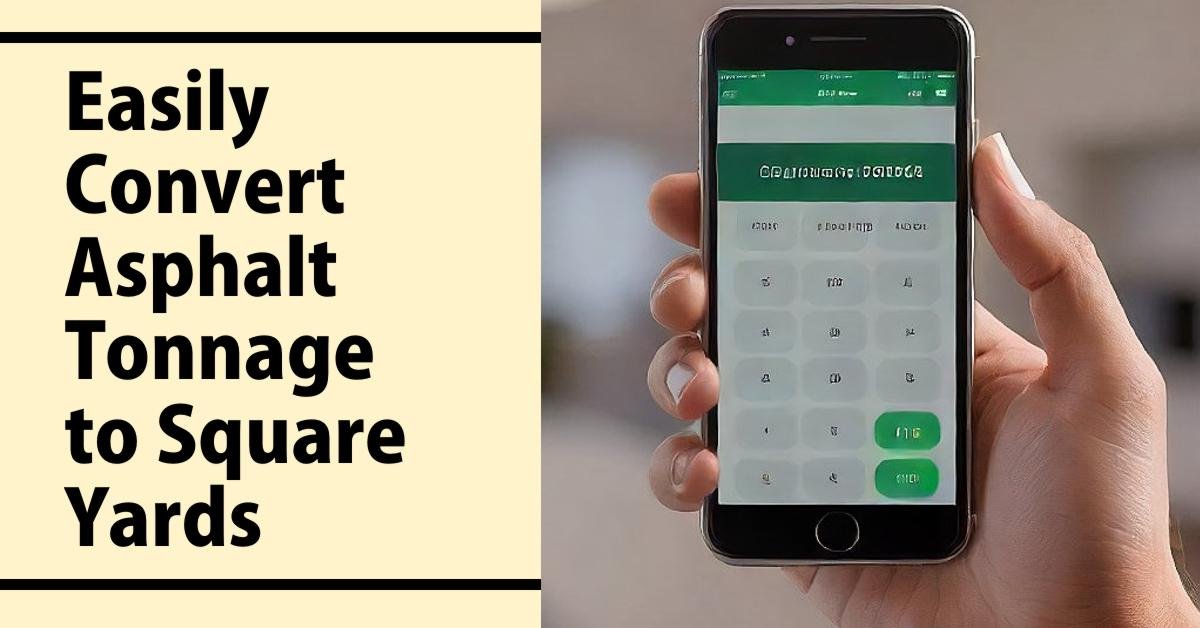[att]
How the Asphalt Tonnage to Square Yards Calculator Works
The Asphalt Tonnage to Square Yards Calculator is designed to help you determine the area (in square yards) required for a given amount of asphalt by weight (in tons). This calculator considers the type of asphalt and the thickness of the asphalt layer, providing an accurate estimate based on industry-standard calculations.
To use the calculator, you need to provide the following inputs:
- Asphalt Tonnage: Enter the asphalt weight in tons you plan to use for your project.
- Asphalt Type: Select the type of asphalt you will be using from the options provided (Hot Mix Asphalt or Cold Mix Asphalt).
- Asphalt Thickness: Enter the desired thickness of the asphalt layer in inches.
Once you have entered these values, click the “Calculate” button, and the calculator will perform the following calculations:
- Determine Asphalt Density: Based on the selected asphalt type, the calculator assigns a density value (in pounds per cubic yard). The typical density values used are 145 lbs/cubic yard for Hot Mix Asphalt and 135 lbs/cubic yard for Cold Mix Asphalt.
- Convert Tonnage to Pounds: The entered asphalt tonnage is converted to pounds by multiplying it by 2000 (1 ton = 2000 lbs).
- Calculate Cubic Yards: The calculator divides the total weight in pounds by the assigned density value to determine the volume of asphalt in cubic yards.
- Convert Cubic Yards to Square Yards: To obtain the area in square yards, the calculator divides the volume in cubic yards by the asphalt thickness (in yards). The industry-standard conversion factor of 36 inches per cubic yard is used for this step.
The final result displayed by the calculator is the approximate area in square yards that can be covered by the specified amount of asphalt tonnage, based on the selected asphalt type and desired thickness.
Asphalt Pavement Estimation
An important calculation for paving projects is converting asphalt tonnage to square yards. The fundamental unit of measurement is cubic yard, which is a volume of a cube measuring 3ft on each side.
It equals 27 cubic feet or about 201.97 gallons, which could form a shape similar to a cube with width, height and length of three feet each.
More than one cubic yard usually comes into play when we work with asphalt. For instance, two cubic yards would be twice this amount or space but in the terms of 54 ft3. When four times more than that would be equivalent to 108 ft3, then four cubic yards will be needed.
The overall volume increases with an increase in the number of cubic yards. Two hundred and sixteen (216) are covered by eight (8) yds3 while five (5) yds3 cover one hundred thirty-five (135).
Asphalt coverage includes how many square yards one asphalt quantity covers depending on the depth or thickness of the pavement layer. Normally only about 3-4 inches of compacted asphalt are used on an average asphalt driveway.
Approximately eighty (80) SqFt will be one cu yard cover at a depth of four inches. It can thus be estimated that approximately two hundred and forty sq feet would be covered by yardage amounting to three.
Therefore, it stands out that each cu yard covers around eighty square feet at a four-inch soil depth as per the conversion factor referred. In other words, approximately three hundred and twenty sq.ft is what will be covered by four cu yd
Coverage area reduces as the depth goes up. It is noticed that under six-inch depth coverages for every square yard may not exceed fifty-four units i.e., they will cover approximately fifty-four SQft. So, if you have a 6inches thick layer then it takes about five cubic yards to cover two hundred seventy SQft.
